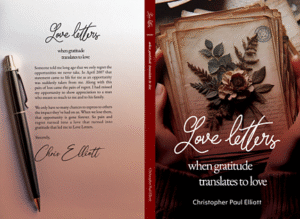There’s a reason you find yourself drafting a message you’ll never send, whispering into the silence, or writing a letter to someone who no longer (or never did) live on this earth.
It might feel strange at first, to write to someone who’s not coming back, who never arrived, or who only existed in a sliver of your life. But you still do it. You still need to.
Why we write to the ones who are gone isn’t always about resolution. Often, it’s about release. About remembrance. About giving shape to feelings that can’t stay locked inside your heart.
Whether it’s a parent you lost too soon, a child who never made it into this world, a love that vanished without a final word, or even a version of yourself left behind—these silent letters matter. And here’s why.
Writing Is How We Hold On—Without Holding Back
Grief doesn’t have a tidy ending. Neither does love, or hope, or longing. But writing gives you a way to carry all of it without collapsing under the weight.
When you put your thoughts into words, especially to someone who isn’t here to hear them, you give yourself permission to feel without editing.
You don’t need a reply. You don’t need permission. You just need space to speak your truth.
Writing to the ones who are gone allows you to say what you couldn’t say before—or what you’re still saying now, day after day, as they echo in your life.
We Need Closure, Even If We Don’t Get Answers
Not every goodbye is clean. Sometimes people leave suddenly. Sometimes they never show up. Sometimes they leave you wondering if you were ever known at all.
In those moments, your mind loops. You replay the same scenes. You imagine better endings. You rewrite history in hopes of soothing the ache.
Writing can be a substitute for the conversations you were denied. A way to finish what was left undone. A bridge between you and a chapter that doesn’t close itself.
Because closure doesn’t always come from the other person. Sometimes, you have to create it yourself—with your own words, on your own terms.
Imagined Conversations Can Be Just as Healing
Maybe you’re writing to someone who died. Maybe to someone who disappeared. Maybe to the child you hoped for, or the partner who never came.
The world might not understand it—but these letters have power.
They let you imagine what you’d say if they were sitting across from you. They let you feel seen and heard, even in the absence of a physical presence.
You don’t need to justify this kind of writing. Your longing is valid. Your imagination is sacred. Your words matter, even if they’re spoken to someone who only lives inside your memories or your dreams.
In Love Letters, Words Bridge the Distance
Christopher Paul Elliott’s book Love Letters beautifully captures this idea—how writing can become a spiritual act of connection. In one chapter, he describes writing to someone he never truly got to say goodbye to.
That letter wasn’t about the response. It was about recognizing the impact, naming the emotion, and honoring what was felt.
The book reminds us that love doesn’t end when a person leaves. Gratitude, grief, and appreciation can still live in the written word. And sometimes, a letter is how we keep someone’s legacy alive inside our own.
Writing Is a Way of Remembering—and Reclaiming
There’s something sacred about putting pen to paper for someone who can’t read your words.
It’s not about productivity. It’s not about being a writer. It’s about remembering.
When you write, you take fleeting memories and make them solid again. You preserve the smell of their cologne. The sound of their voice. The way they made you laugh when life felt too heavy.
And in doing that, you reclaim something. A part of you that still belongs to the story. A part of them that still belongs to your life.
We Write What Our Souls Can’t Carry Alone
Some feelings are too heavy to keep inside. They don’t go away when you distract yourself. They don’t vanish when the world tells you to move on.
But when you write, those feelings become lighter. Not gone—but shared.
You create a container for your sorrow, your joy, your wonder. A space where nothing has to be explained or solved. Only honored.
Writing is how you keep the conversation going, even when the other person isn’t there to talk back.
And sometimes, that’s enough.
Letters to the Lost Are Also Letters to Ourselves
Here’s something you may not have realized: when you write to someone who’s gone, you’re also writing to yourself.
You’re telling yourself that what you felt was real.
That your memories matter.
That your love is still alive—even in absence.
These letters are as much for you as they are for them.
They remind you of your strength. Your tenderness. Your capacity to love without limits. And they become a record of your emotional truth, which no one can take from you.
How to Start Writing to the Ones Who Are Gone
You don’t need rules. You don’t need a perfect notebook or a quiet day. You just need your truth.
But if you’re unsure where to begin, try this:
- Start with “I miss you because…”
Let the words tumble out. Be specific. Be raw. Be honest. - Write about a memory.
Bring them back to life for just a moment. Let the smells, sounds, and feelings come alive. - Say what you couldn’t say before.
No judgment. No filter. Whether it’s gratitude, rage, or regret—write it. - Include what you wish for.
Even if it can’t come true, the act of naming your hope is healing in itself.
It’s Okay If No One Understands
Sometimes people will question why you’re still writing to someone who’s “gone.” Why are you still holding on to something invisible?
Let them.
This isn’t for them. It’s for you.
For your healing. Your growth. Your ability to carry love forward, even when it has nowhere to land.
And if you ever feel alone in this practice, just know: there are so many others who are doing the same. Writing in the dark. Remembering out loud. Grieving with ink and paper.

Final Thought: The Words Still Need to Be Spoken
No matter how much time has passed, or how invisible your person may be, your words still matter.
They still deserve to be spoken.
You’re allowed to miss someone and write them back into your world. You’re allowed to honor what never was and what will never be. You’re allowed to let your heart speak, even if no one else is listening.
Because that letter? It’s more than words. It’s a love that refuses to vanish.
It’s a truth that deserves to live. And it’s a gift you give both to them—and to yourself.
Ready to Put It on Paper?
If you’re carrying words you never got to say, consider starting with a letter—one you may never send, but one your heart needs to write.
Christopher Paul Elliott’s Love Letters is a powerful example of how these messages can be transformative. Honest. Redemptive. Healing.
Explore the book here and let it inspire you to write your own letter—to whoever is still lingering in your heart.




